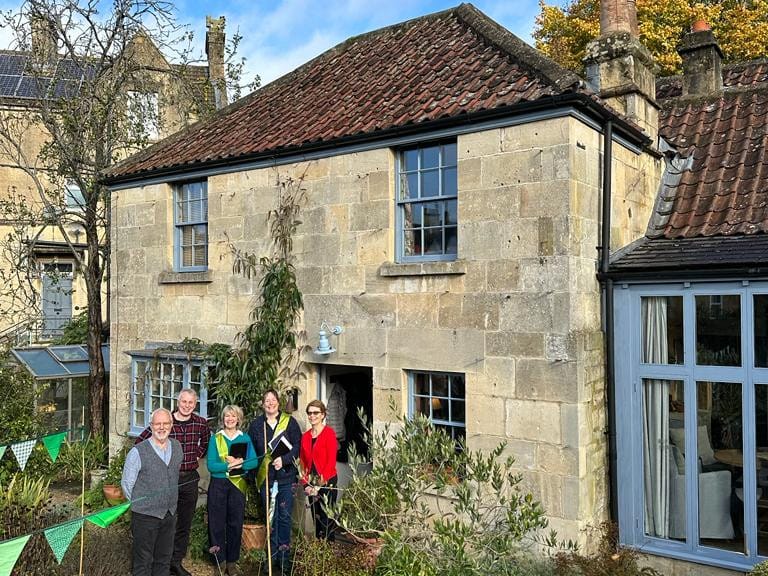Why Retrofit Open Days Matter

Grass Roots Show Green Shoots
Bath, a city famous for its Georgian architecture and historic charm, is also a hotbed of support for sustainable living. On the weekend of October 12th and 13th, the city will once again open its doors for Green Open Homes Day, an inspiring grassroots event that highlights how ordinary homes can be transformed into energy-efficient, eco-friendly dwellings. Whether you're curious about retrofitting your home, interested in renewable energy options, or simply looking to reduce your carbon footprint, the event offers an invaluable opportunity to learn from homeowners who are already making a difference.
Organised by local volunteers and supported by Bath & West Community Energy (BWCE) and the Centre for Sustainable Energy (CSE) in Bristol, Green Open Homes Days are part of a growing national movement designed to showcase the practical steps we can all take to combat the climate crisis. This year’s event promises to be bigger than ever, with a range of properties on show—from retrofitted period homes to modern eco-houses—all demonstrating that sustainability and comfort can go hand in hand.

As climate concerns intensify and energy prices soar, events like Green Open Homes Day are proving vital in showing that real solutions exist. The fact that this movement is grassroots-led, with local people in the driving seat, only underscores the importance of community action in the face of national inertia.
A National Movement with Local Roots
The Green Open Homes initiative was born out of the Centre for Sustainable Energy (CSE) in Bristol, a charity with a 40-year track record of promoting sustainable energy solutions. Since its inception, CSE has been a champion of community-led environmental action, providing advice, support, and resources to help individuals and local groups take the necessary steps towards a more sustainable future.
The first Green Open Homes events began with a simple yet powerful idea: to open up homes that had undergone energy-efficient retrofits to the public. Homeowners would explain what they did, why they did it, and—importantly—how others could do the same. The idea quickly took off, and it has since spread across the country, helping thousands of people understand the tangible benefits of sustainable home improvements—from improved insulation to solar panels, heat pumps, and energy-efficient glazing.

In Bath, this ethos has been embraced with enthusiasm. Homeowners across the city and surrounding areas have taken the lead in organising their own events, offering visitors the chance to see firsthand how older properties can be transformed with green technologies, without losing their character or heritage. This community-driven spirit has been a major factor in the event's success.
As Pete Capener, Managing Director of BWCE, explains,
“Open Homes are a crucial part of our community energy vision. Since 2010, Bath & West Community Energy has been installing community-owned renewable energy projects. We have 29 projects on school roofs and 5 solar fields, which have become biodiversity havens. However, to wean ourselves off fossil fuels, as well as generating renewable energy, we need to reduce the energy we use in our homes. With energy prices still high, this is important for reducing the cost of living. We feel there is a strong role for shared community action here, as exemplified by Green Open Homes B&NES, where you can visit a neighbour’s energy-efficient home, or a home similar to yours, and hear firsthand about their experience.”
BWCE’s holistic vision of community energy—combining renewable generation with home energy reduction—fits perfectly with the ethos of Green Open Homes. It’s not just about individual action, but about building a supportive network of like-minded people working towards a shared goal: a cleaner, more sustainable future.
A Platform for Grassroots Organisations
Green Open Homes Days are not just about the homes themselves; they are about the wider community networks that support them. Bath is part of a growing movement of local groups across the UK that are taking matters into their own hands when it comes to sustainability. These grassroots organisations are the beating heart of the movement, proving that local action can make a national impact.
One such group is the Wiltshire Climate Alliance, a neighbouring organisation that is also hosting a Green Open Homes event this year. Wiltshire Climate Alliance, known for their vigorous campaigns against local incinerators, is a shining example of how community action can challenge unsustainable practices while promoting better alternatives. Their involvement in Green Open Homes showcases practical ways homes can be adapted to meet the challenges of the future, demonstrating that local initiatives can have a profound effect.

The grassroots nature of these organisations is critical. As Kate Sweet, Project Manager for Green Open Homes B&NES, points out,
“It’s been amazing to work with communities throughout B&NES to organise eight Open Homes events this year. It has been a success because of the grassroots groups within the communities we have worked with, and also the reach of our strong partnership of BWCE, Bath & North East Somerset Council, Bath Preservation Trust, Buro Happold, the University of Bath, Transition Bath, Retrofit West and the Centre for Sustainable Energy.”
Kate highlights the importance of local collaborations and partnerships, noting that Green Open Homes wouldn’t have been possible without the joint efforts of community organisations and larger institutions.
The funding from the South West Net Zero Hub and sponsorship from Good Energy and Mitchell and Dickinson has been instrumental in ensuring the event’s success.

BWCE’s involvement also ensures that the conversations sparked at Green Open Homes don’t stop at the doorstep. As Sara Grimes, Home Energy Programme Manager for BWCE, points out,
“We know there are many people who want to make their homes more efficient. It is essential that they are enabled to do so, and BWCE’s aim is to support people wherever they are on their home energy journey. Our Open Homes event avoids hours of internet trawling, and 70% of visitors take action after their visit.”
Sara’s comment underscores the practical impact of events like Green Open Homes: they don’t just raise awareness, they lead to action. For those seeking more detailed advice after their visit, BWCE offers expert home energy efficiency surveys, a service tailored to the specific needs, preferences, and budgets of homeowners. These surveys provide much more detailed recommendations than a standard Energy Performance Certificate (EPC), and they come with the added benefit of grant-funded services for listed buildings or group retrofits in similar homes.
The Power of Retrofit: Why It Matters
For many homeowners, the idea of retrofitting can seem daunting. Where do you start? How much will it cost? Will it really make a difference? Events like Bath’s Green Open Homes Day are designed to answer these questions and more, demystifying the retrofit process.
Retrofitting involves upgrading an existing building to improve its energy efficiency. This can include anything from installing better insulation to replacing windows, upgrading heating systems, or generating renewable energy on-site through solar panels or heat pumps. For period homes, such as many of those in Bath, it can also involve clever solutions that preserve the building’s historical features while reducing its carbon footprint.
One of the key messages of Green Open Homes is that every small change counts. Whether it’s fitting draft-proofing around doors and windows or installing a more efficient boiler, each step towards making a home more energy-efficient contributes to the bigger picture of reducing carbon emissions and lowering energy bills.
The importance of retrofit cannot be overstated. In the UK, where much of the housing stock is old and energy-inefficient, improving the energy efficiency of homes is one of the biggest opportunities to tackle climate change and reduce energy bills. Housing accounts for around 20% of the UK’s carbon emissions, and retrofitting is crucial to meeting the country’s net-zero targets by 2050.
BWCE’s role in facilitating this transition is crucial. By making energy efficiency accessible to a wider audience, they are helping homeowners to navigate the often-complex process of retrofitting their homes. As Sara Grimes explains,
“BWCE can provide expert home energy efficiency surveys...suggesting a course of action alongside energy and carbon savings.”
Why Grass Roots Matter
The more people who attend events like Bath’s Green Open Homes (and the more momentum the movement gains. It’s not just about individual homeowners making changes—it’s about building a critical mass of people who understand the importance of sustainable living and who are willing to take action.
As Pete Capener puts it,
“We feel there is a strong role for shared community action here.”
The success of Green Open Homes is a testament to the power of collective action. By creating spaces where people can learn, share experiences, and take concrete steps towards reducing their carbon footprint, these events are helping to accelerate the transition to a low-carbon society.
While government action remains slow, the work of grassroots organisations like BWCE, Wiltshire Climate Alliance, and many others across the UK shows that change is happening from the ground up. These groups are operating in a vacuum of national policy, but their efforts are proving that, with the right support, local communities can lead the way in creating a more sustainable future.
The fight against climate change is far from over, but thanks to the tireless efforts of local groups and the success of initiatives like Green Open Homes, we can be optimistic. The solutions are out there, and they are being driven by the very communities that will benefit the most from a cleaner, greener, more energy-efficient world.




